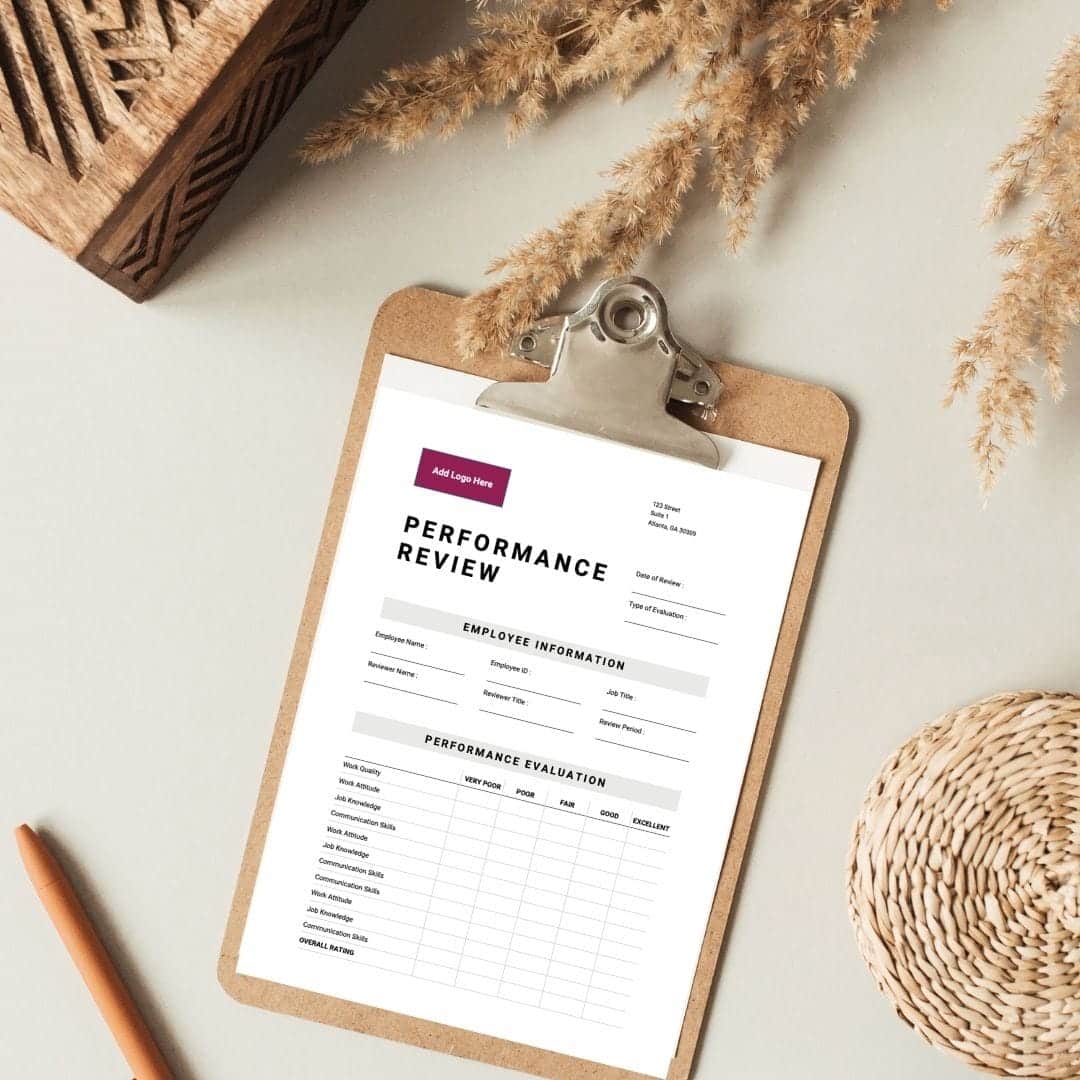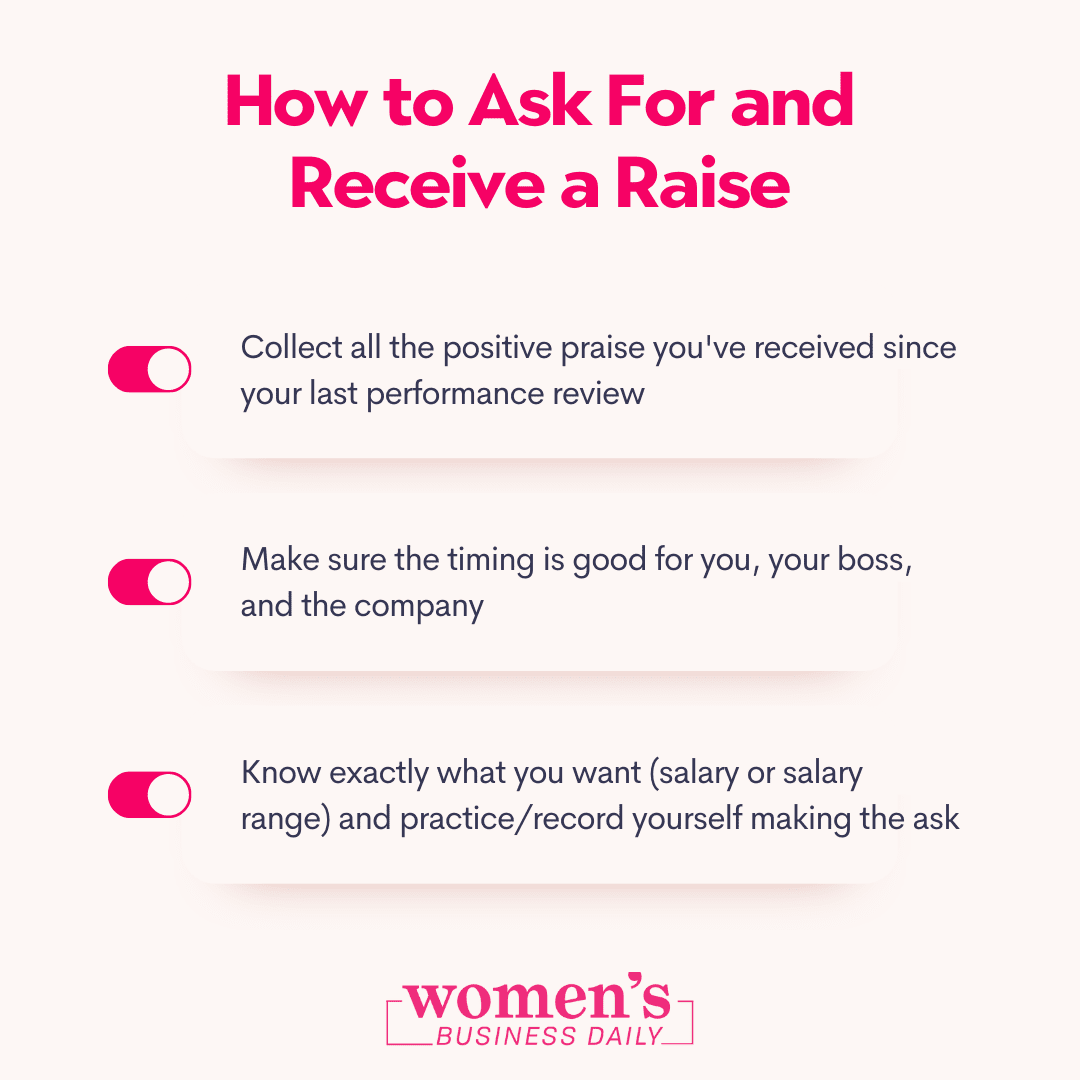Not everyone feels comfortable talking about their accomplishments. But there are two professional instances where it is absolutely necessary: an interview and a performance review.
A performance review is an opportunity for your boss to tell you how you are succeeding and how you can improve. It also gives employees a chance to share the accomplishments bosses may not have seen on their end.
Employees can also discuss their future career goals with their superiors. And a good boss will help create a plan to achieve those set goals. An employee performance review should make the employee feel heard.
But nothing makes a performance evaluation more anxiety-producing than when you are preparing to ask for a raise. So how do you set yourself up for success?
Here are some tips on how to prepare for your performance conversation, whether it’s your very first or your 20th.

Sign up for a Women’s Business Daily Membership to download our free performance review template (In the Membership Resource section)
1. Review Previous Reviews
If this isn’t your first review with this company, take a look at your previous performance reviews. This is your chance to see how you’ve grown since your last review and remind yourself of the qualifications you’ll be judged on. See what qualities your reviewer values and think about how you’ve upheld them over the course of the year.
Is this your first time getting reviewed by this company? Is this your first time ever receiving a performance review? Don’t panic. Your coworkers are here to help.
Find a trusted peer who has been through the performance review process before and get their perspective on what the process was like. Ask what you can expect to be asked and what the boss will want you to talk about. Getting a general sense of how the evaluation goes will help prevent you from being blindsided and will hopefully minimize any anxiety you’re feeling.
2. Complete Your Self-Review
Some companies have an official form or performance management software for you to fill out before your evaluation. This form is called a self-evaluation and will be reviewed along with your superior’s official evaluation. This form is your chance to bring to your boss’s attention all the additional work you’ve done behind the scenes that they may not have noticed from their level.
However, if your company does not offer an official self-evaluation, you should still do one for your own mental organization. Your boss is going to ask you questions like how you think you grew this year and areas you thought you exceeded expectations. And you don’t want to look like you’re being put on the spot. Be prepared to showcase your accomplishments and have plenty of examples of how you improved over the course of the year.
Awareness of your strengths and weaknesses will give you the best chance of continuing to excel where you already do and get the chance to improve on a specific task you currently struggle with.
Effective performance reviews should not be one-sided. You should have just as much say in your own quality of work and should get the chance to explain how the company could support you more effectively.

3. Prepare Your Case for a Raise
If you plan on ending the performance review by asking for a raise, it’s time to assemble your case.
Why do you deserve a raise? What value have you added to the company that merits an increase in pay?
One way to prove that you deserve additional compensation is by reviewing your job description and the job descriptions of positions above yours. What are you currently doing that is outside of your job description?
One of the strongest cases for raise is proving that you are going above and beyond by performing tasks that are above your pay grade and outside of the expectations of your position.
If you aren’t going to be compensated for your additional work, why should you give the company additional value? The right company will recognize that employees going above their usual workload should be compensated for their efforts.
Another solid example in a case for a raise is tangible figures of how you added monetary value to the company. Did you close a particularly lucrative deal? Did you streamline a process that saves the company production costs? If you added revenue to the company, it makes sense that you deserve additional compensation.
Another reason for a raise is your increased value as an employee. Did you gain an additional certification this year? Did you go back to get your master’s? If you added to your education in some way, you’ll bring more value to the company, and should therefore be compensated for your newfound expertise.
4. Moving Forward with Confidence
Now that you’ve received your performance review, it’s time to take their constructive advice and make improvements as an employee. Take their notes and run with them. This is your chance to apply their feedback in tangible ways if there are any areas where you feel like you are a poor performer.
Do they:
- Think your work quality is excellent but feel like they never know where you are in the project? Set a goal to send updates to crucial team members once a day via email or Slack.
- Think you have good ideas but rarely share them? Make a point to speak up during meetings so you can improve your employee engagement.
- Think you have a lot of creativity but have trouble sticking to guidelines? Make yourself a checklist with every rule and guideline for the project and only hit submit after you’ve followed all the necessary rules.
It’s one thing to take initiative and do things correctly before you’re even asked. It’s perhaps an even more important thing to receive feedback with grace and take action steps towards addressing it.
Being able to take direction from others goes a long way in terms of self-improvement, especially when you consider an outside perspective on your workflow.
Your Performance Review Shouldn’t Make You Feel Anxious
Worried about your performance review? Take a step back and find the source of this anxiety.
Are you worried about what your boss might say to you when you’re face to face? Take a look at all you’ve accomplished this year so you can boost your confidence and determine where you can improve so you aren’t blindsided if they offer constructive feedback.
Managers and employees should use the performance review as an opportunity to improve the company as a whole. Employees can use the review to improve their performance. And the bosses should use the feedback from the employee to improve the way the company is run.
Did you leave your performance review with more negatives than positives? Use this opportunity to constructively apply their suggestions to your work habits so you can kill it in future performance appraisals.
Published in Career, Featured ArticlesAuthor, Artist, Photographer.
Sarah Margaret is an artist who expresses her love for feminism, equality, and justice through a variety of mediums: photography, filmmaking, poetry, illustration, song, acting, and of course, writing.
She owns Still Poetry Photography, a company that showcases her passion for capturing poetic moments in time. Instead of poetry in motion, she captures visual poetry in fractions of a second, making cherished keepsakes of unforgettable moments.
She is the artist behind the Still Poetry Etsy shop, which houses her illustrations and bespoke, handmade items. She is the author of intricacies are just cracks in the wall, a narrative poetry anthology that follows a young woman discovering herself as she emerges from an abusive relationship.





